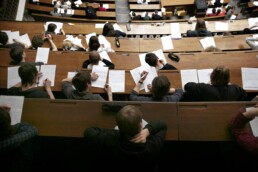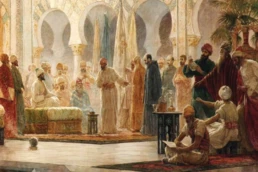For a while I’ve grappled with widespread Islamic narratives feeling like I’m in an alternate reality. For yonks I’ve been trying to understand how people have translated the Quran and the sunnah into something so uninspiring, problematic, irrational, anxiety-inducing, and destructive. But as time has gone on, it’s becoming quite clear.
We live in times where things have changed but methods related to a bygone era haven’t. In old times and an age of mass illiteracy scholars traditionally had two audiences to whom they’d provide explanations and engage: 1) the common folk who were very simple-minded – medieval village folk, and 2) intellectuals, usually leaders, noblemen and other scholars. It all made sense back then. The illiterate masses weren’t able to reason well nor understand complex systems of thinking. On the other hand, the elite weren’t sufficed with simplistic explanations nor would accept them, especially if they occupied positions of authority which required them to understand the functional purpose behind laws or doctrines. In the end, the simple folk were (rightly) told to focus on ‘spirituality’ and simply pay their taxes (zakat) which kept them away from using their severely limited reasoning skills that’d lead them to incorrect conclusions, whilst the elite were deeply informed of the Law and scriptures with functional knowledge that would allow them to operationalise every aspect of revelation. To them God’s law was wholly rational, comprehendible to human minds, full of purpose, meaning and public benefit. There was nothing arbitrary about it nor superstitious or irrational. This wasn’t about existential value – the righteous elite didn’t look down on the common folk with hubris but they recognised a hierarchy in which the elite with aptitude not only led, but if they didn’t society would crumble into disorder and chaos. To leave the land to village folk religion would permit superstition and irrationality to run riot, and the downfall of monotheistic civilisation. The common folk also recognised the aptitude of the elite and were content with the hierarchy out of self interest. This (very rudimentary characterisation) was the case for a thousand years.
Times changed. Mass illiteracy turned into mass literacy. Generations became increasingly informed about the world, yet the nature of the two modes of explanation didn’t change. Today, due to mass literacy, many people fall into yesterday’s category of the elite, yet the shar’i narrative is delivered to the masses as if the vast majority are medieval village folk.
Let me draw on a near-recent campaign around reading the Qur’an in a language the reader understands. For the elite (who all did so) they would’ve found the humming of phonemes quite bizarre. They would’ve said: “Poor commoners bizarrely have no idea what they’re saying, but given they’re illiterate and have nothing else, let them continue to venerate scriptures so that they don’t rebel against the Law of God which they don’t get, but at least they’ll consider it holy and submit.”
Now every time I explain things to people I’m usually met with surprise because they’d never heard it. They’re even more surprised when I point to the ancient heritage of shar’i thinking and literally show them pages where mainstream scholarly thinking was always what I’ve said.
The common response I get is either 1) “How comes we’ve never heard this?!” or 2) “How are you the only one saying this?!” On 1 it’s because medieval explanations given to the elite have remained niche rather than widespread today, and what remains widespread today, although the context has changed, is the narrative that was articulated to medieval common folk living mostly in agrarian communities. On 2, I’m not the only one (that’s absurd), there are quite a few educated folk who are informed of the shari’ah and re-educate their people, but the sheer numbers of folk religion advocates drown out the minority to maintain the status quo.
It’s how you have the most bizarre situation where a high level barrister or surgeon who employs reason and the science of assiduous deduction in their professional lives turn into superstitious and irrational babbling village fools the minute they switch on their “religious” button. It’s not that they’re inherently foolish but they’ve been socialised by others into foolish thinking!
Much of what we say has little to do with tone. Some people are just committed to a narrative that was shaped for illiterate medieval common folk, that’s what they find familiar and thus comforting. Others understandably find the narrative reserved for the medieval elite captivating and aren’t willing to settle for anything less. We need to make the narrative of the medieval elite mainstream for a few important reasons. Amongst them is that we’ll see more people convert as well as prevent the disenchantment of future generations for whom medieval commoner explanations simply won’t do. That’s just not the world anymore.
To end:
You’ve never heard many things we teach because you’re being told the stories that were reserved for simple village folk, and not that told to the medieval educated. And no I’m not the only one who knows the mainstream narrative and learnings of the medieval elite, many brethren are likewise informed (and more so than me) – some of them I personally know and hold in esteem, others I don’t but I wish them success!




